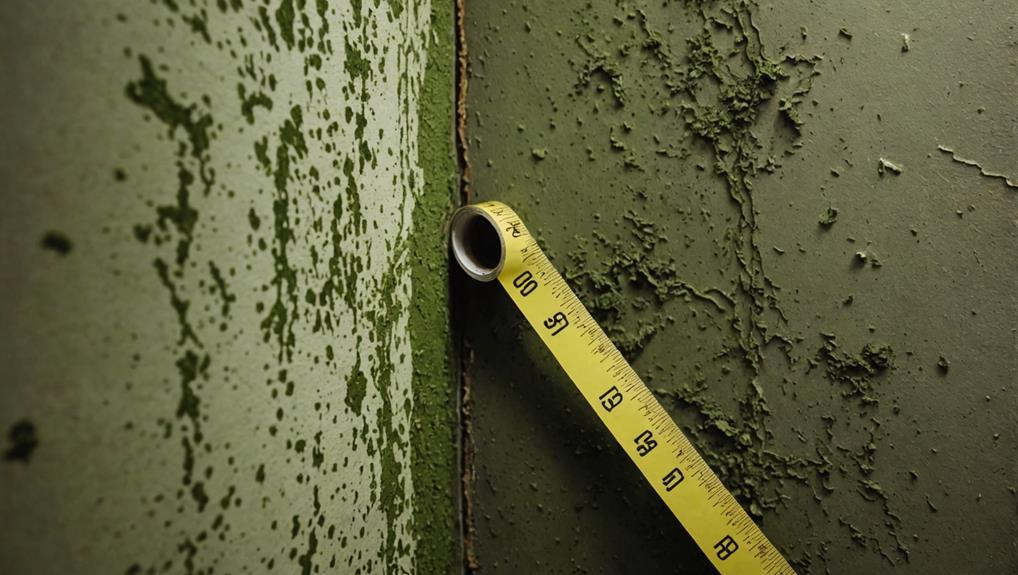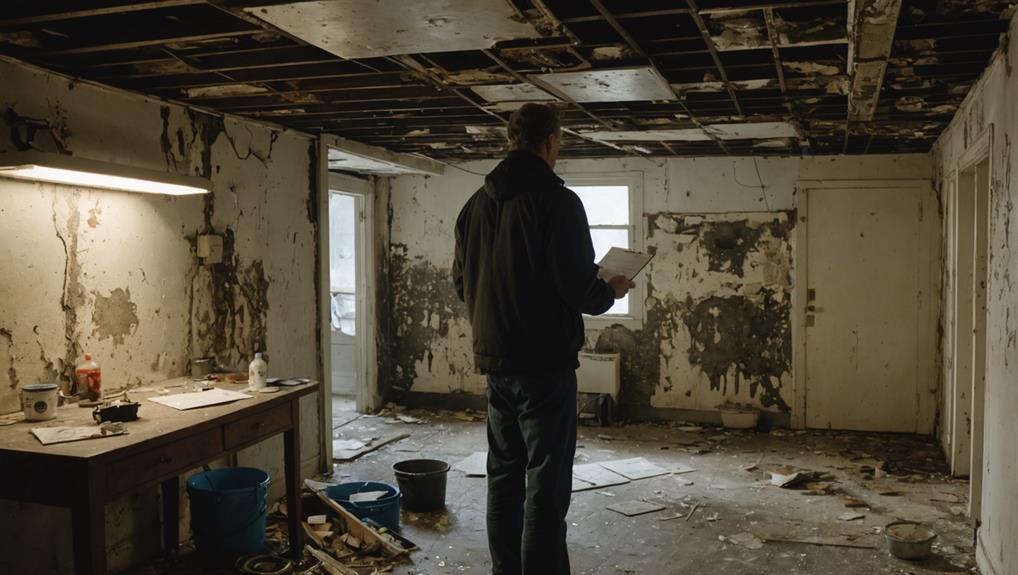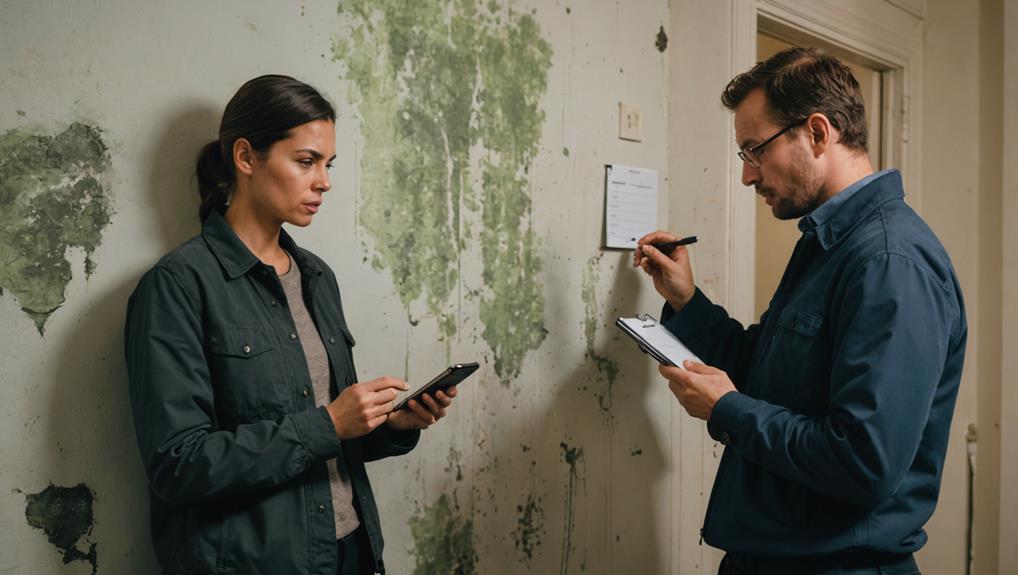When dealing with mold, it's vital to understand your rights and responsibilities. As a tenant, you have the right to live in a safe environment, meaning landlords must address mold promptly. They're required to perform inspections, disclose known issues, and undertake effective remediation. If your landlord fails to comply, you might have grounds for legal action or withholding rent. Conversely, landlords are responsible for maintaining properties and preventing mold growth through regular inspections and repairs. Fulfilling these obligations is fundamental for both your health and financial stability, and there's more you can investigate regarding mold regulations and procedures.
Understanding Mold and Its Risks

Mold is a common yet often overlooked hazard in residential environments, posing significant health risks to tenants. Understanding the various mold types is vital for recognizing potential dangers. Common varieties include Aspergillus, Penicillium, and Stachybotrys, each with unique characteristics and health impacts. For instance, Stachybotrys, often referred to as black mold, is notorious for its association with chronic respiratory issues and neurological symptoms.
When mold proliferates, it releases spores into the air, which can lead to allergic reactions, asthma exacerbations, and other respiratory ailments. You might experience symptoms like coughing, sneezing, or skin irritation, but the risks extend beyond immediate discomfort. Prolonged exposure can result in severe health complications, including serious infections or long-term pulmonary issues.
It's fundamental to recognize that mold thrives in damp, poorly ventilated areas. By maintaining awareness of mold types and their respective health impacts, you empower yourself to identify and address potential mold hazards in your living environment. Ultimately, knowledge is your best defense against the insidious dangers of mold, ensuring you can take proactive steps to safeguard your health and well-being.
Tenant Rights Regarding Mold
As a tenant, you have specific rights when it comes to mold in your rental unit. Landlords are typically required to disclose any known mold issues and are responsible for addressing and remediating mold problems promptly. Understanding these obligations can empower you to take action if mold becomes a concern in your living space.
Mold Disclosure Obligations
When it comes to tenant rights regarding mold, understanding your landlord's disclosure obligations is crucial for maintaining a safe living environment. Landlords are often bound by state and local laws to provide clear tenant notifications about mold hazards. Here's what you need to know about their disclosure requirements:
- Mold Testing Results: Landlords must disclose any relevant mold testing results, ensuring you're aware of potential health implications.
- Inspection Protocols: They should follow specific inspection protocols to identify mold issues promptly and accurately.
- Remediation Timelines: If mold is found, landlords are required to outline remediation timelines to address the issue effectively.
- Legal Definitions: Understanding the legal definitions related to mold can empower you to recognize your rights against liability issues.
Keep in mind that failure to comply with these disclosure obligations can have serious consequences for landlords. Your awareness of these responsibilities not only helps safeguard your health but equally reinforces your position in ensuring a safe living environment. Be proactive in seeking information, as it's your right to live in a mold-free home.
Repair and Remediation Rights
Understanding your rights in the context of mold issues extends beyond just disclosure; it encompasses repair and remediation responsibilities as well. As a tenant, you have the right to a safe and habitable living environment. When mold is present, it's vital to act swiftly. If you suspect mold, you should request mold testing from your landlord. It's their responsibility to guarantee the property is free from hazardous conditions.
Once mold is confirmed, your landlord must implement effective remediation techniques to eliminate it. This could involve specialized cleaning, repairs to leaks, or even professional mold removal services. You should document all communications regarding mold issues, including requests for testing and remediation. This documentation can be key if disputes arise.
If your landlord fails to address the mold problem in a timely manner, you may have the right to take further action, such as withholding rent or seeking legal remedies. Always be aware of your local laws regarding tenant rights, as they can vary widely. Knowing your rights empowers you to advocate for a healthier living environment and guarantees your landlord fulfills their obligations. Don't hesitate to assert your rights when it comes to mold issues.
Landlord Responsibilities for Mold

As a landlord, you have specific responsibilities when it comes to mold prevention and maintenance in your property. This includes ensuring proper ventilation and promptly addressing any mold issues that arise. Failing to meet these obligations can not only affect the health of your tenants but may likewise lead to legal consequences.
Prevention and Maintenance Obligations
A significant aspect of tenant rights revolves around the landlord's responsibilities for mold prevention and maintenance. To protect your living environment, landlords must prioritize effective measures that minimize the risk of mold growth. This proactive approach not only guarantees tenant safety but additionally protects property values.
Here are four key responsibilities landlords should uphold:
- Regular Mold Inspections: Conduct periodic mold inspections to identify potential issues before they escalate. This vigilance is vital for maintaining a healthy environment.
- Moisture Control: Implement effective moisture control strategies, such as proper ventilation and dehumidification, to prevent dampness that promotes mold growth.
- Timely Repairs: Address leaks or water intrusion promptly. Delay in repairs can lead to significant mold problems, compromising tenant safety and property integrity.
- Clear Communication: Maintain open lines of communication with tenants regarding mold concerns. Educating tenants about moisture control can empower them to play an active role in prevention.
Response to Mold Issues
When mold issues arise, landlords have specific responsibilities to guarantee the health and safety of their tenants. It's vital for landlords to respond promptly and effectively to mold complaints, as the health impacts of mold can be severe, including respiratory issues and allergic reactions. First, you must conduct extensive mold testing to identify the extent of the problem. This step not only demonstrates your commitment to tenant welfare but also reduces potential legal liabilities.
Once mold is detected, your responsibilities escalate. You're required to implement timely remediation measures, which may involve hiring professionals to address the issue thoroughly. Simply painting over mold or attempting superficial fixes won't suffice and can lead to greater problems down the line.
Moreover, clear communication with your tenants is critical. Inform them about the steps you're taking and any safety precautions they should observe during the remediation process. By acting decisively and transparently, you not only comply with your legal obligations but also build trust and a positive relationship with your tenants. Ultimately, prioritizing the health and safety of your tenants will protect your property investment and uphold your reputation as a responsible landlord.
Legal Consequences for Non-Compliance
Failure to comply with tenant laws can lead to significant legal consequences for landlords. Ignoring mold issues not only jeopardizes tenant health but likewise exposes landlords to serious repercussions, including mold litigation and tenant lawsuits. Understanding these potential consequences will empower you to take the necessary actions to protect your interests.
- Financial Liability: Landlords may be held responsible for damages resulting from mold exposure, including medical expenses for affected tenants.
- Legal Fees: If tenants pursue lawsuits, you could incur substantial legal fees defending against claims related to mold negligence.
- Repairs and Remediation Costs: Non-compliance may necessitate costly mold remediation efforts, which can escalate quickly depending on the extent of the issue.
- Loss of Rental Income: Properties plagued by mold may become uninhabitable, resulting in loss of rental income and potential vacancies.
Steps for Reporting Mold Issues

Reporting mold issues promptly is vital to guarantee both tenant safety and landlord compliance with health regulations. Start by documenting the problem; take detailed notes and photographs of the affected areas. This evidence will be significant for mold testing and can strengthen your case if further action is necessary. Next, notify your landlord in writing, clearly stating your concerns about potential health effects related to mold exposure.
Make sure to reference any relevant local health codes or regulations that pertain to mold in rental properties. This illustrates your awareness of your rights and the landlord's obligations. Set a reasonable timeframe for the landlord to respond—typically 7 to 14 days is advisable. If you don't receive a response, consider contacting local health departments or housing authorities to escalate the issue.
Additionally, you may want to consult with a mold remediation expert for an independent assessment. This could provide further leverage in discussions with your landlord. Understanding the legal framework surrounding mold issues will empower you to advocate effectively for your health and safety within your living environment.
Preventative Measures for Tenants and Landlords
Preventative measures play a crucial role in maintaining a healthy living environment for both tenants and landlords. By implementing effective mold prevention strategies, you can greatly reduce the risk of mold growth and its associated health hazards. Here are key actions to take into account:
- Air Quality Monitoring: Regularly assess indoor air quality to identify humidity levels and potential mold growth conditions.
- Tenant Education Programs: Equip tenants with knowledge on how to recognize early signs of mold and the importance of reporting issues promptly.
- Landlord Training Seminars: Make certain landlords are well-informed on mold prevention practices, legal obligations, and maintenance responsibilities to promote proactive management.
- Routine Inspections: Schedule periodic inspections of properties to detect leaks, dampness, or other conditions favorable to mold growth.
Conclusion
In maneuvering the murky waters of mold, you've got rights that could rival a superhero's cape! Remember, your landlord's responsibilities are like a sturdy shield against mold-related chaos. If they fail, legal consequences can loom like a thunderstorm on the horizon. By staying proactive and reporting issues promptly, you can keep your living space safe and sound. So, whether you're a tenant or a landlord, don't let mold turn your home into a horror story—take action and protect your haven!
